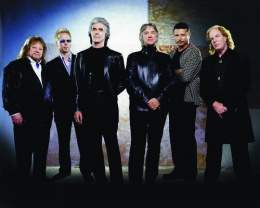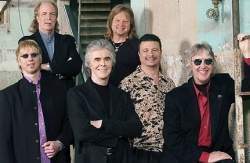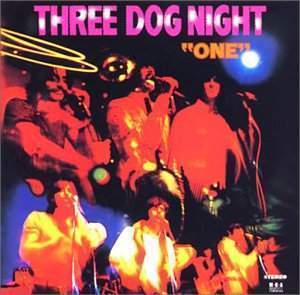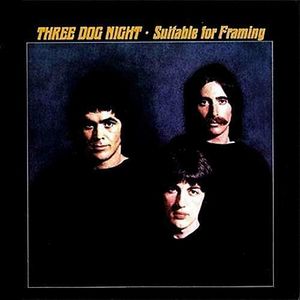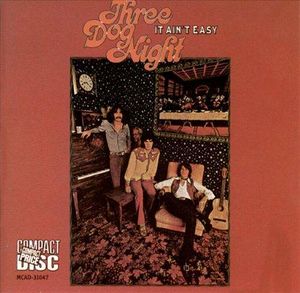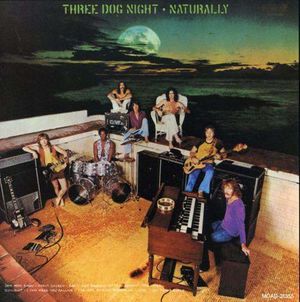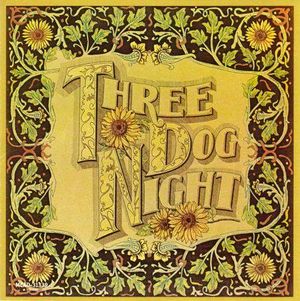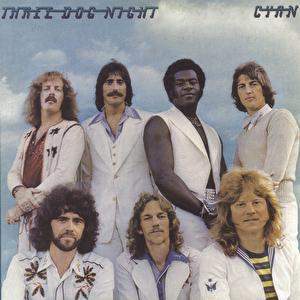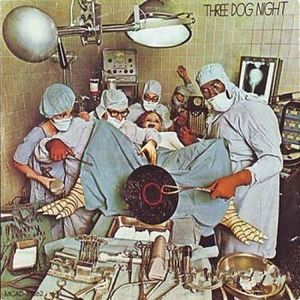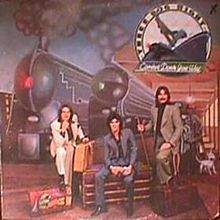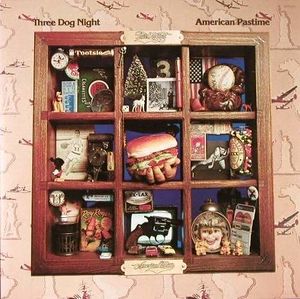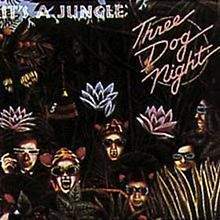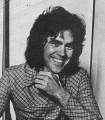Three Dog Night
| ||||||||||||||||||||||||||
Three Dog Night. Banda pop-rock californiana de los años 60 y 70, que tuvo grandes éxitos comerciales en sencillos, destacando la conocida "Mama Told Me (Not to Come)", un tema escrito por Randy Newman que editaron en 1970 y que habían grabado antes los Animals en los 60. Su influencia en la escena musical contiene 21 temas entre las 40 más populares, 11 en el Top 10 de la Billboard, 3 número 1, 7 sencillos que vendieron más de un millón de copias, 12 discos de oro consecutivos por sus LPs. Para finales de 1975 habían vendido 50 millones de copias.
“Soma”, “Subrosa” y “Tricycle” fueron algunos de los nombres con los que quisieron llamar a la banda, hasta que un día la novia de Danny Hutton, June Fairchild, leyó un artículo en una revista en el que se explicaba cómo los aborígenes australianos cavaban hoyos en el desierto para dormir, mientras se calentaban con un perro dingo. Cuando hacía mucho frío usaban un segundo perro. Por eso la noche más fría en el campo australiano se llama "noche de tres perros" (Three Dog Night) y de ahí viene el nombre.
Sumario
Trayectoria musical
Three Dog Night es el resultado de la fusión de tres solistas de escaso relieve y cuatro músicos procedentes de grupos sin éxito. Entre 1968 y 1975 lograrían vender más de 15 millones de discos, logrando 11 discos de oro por LP’s y otros tantos por singles que colocaron invariablemente en el top-10 del ranking estadounidense. Un aspecto notable en esta trayectoria radica en que la banda nunca interpretó material propio, sino canciones de otros autores, lo cual hace más meritoria su longevidad. La conjunción vocal de los tres solistas fue, sin embargo, la clave de todo su poder y calidad.
Impulsores de Three Dog Night fueron Cory Wells (5-2-44, Buffalo, Nueva York) y Danny Hutton (10-9-46, Buncrana, Irlanda). El primero había cantado en una banda llamada The Enemys y el segundo había obtenido un leve hit con el tema Roses and rainbows. El tercer solista, Chuck Negron (8-6-45, Bronx, Nueva York), procedía de estudios de grabación y había doblado la voz de Danny al grabar uno de sus temas, Funny how love can be.
El aglutinante principal de Three Dog Night fue Cory, que tras trabajar en dos películas, Riot on sunset strip y The moving target, formó la Cory Wells Blues Band en 1967, de fracaso inmediato. Los tres decidieron aunar fuerzas en 1968, acompañándose por una banda formada por excelente músicos de otras formaciones: Mike Allsup (8-3-47, Oakdale, California, guitarra solista, ex-Family Scandar), Jimmy Greenspoon (7-2-48, Los Ángeles, California, órgano, ex-East Side Kids), Floyd Sneed (22-11-42, Calgary, Alberta, Canadá, batería, ex- José Feliciano y ex-Bobby Taylor and The Vancouvers) y Joe Schermie (12-2-46/25-3-2002, bajo, ex-Dyke and The Blazers).
El debut de Three Dog Night se produce con el single Nobody, al que sigue Try a little tenderness. El tercer single es One, de Harry Nilson, que se convierte en su primer éxito. Eli’s coming, de Laura Nyro, y especialmente Easy to be hard, de Hair, confirman a la banda como la nueva sensación vocal de 1969.
A partir de aquí, los éxitos son continuos: Celebrate, Mama told me (Not to come) de Randy Newman, One man band de Leo Sayer, Liar de Russ Ballard, Joy to the world de Axton, tema que durante 7 semanas es n.º 1 en Estados Unidos, An old fashioned love song, Never been to Spain también de Axton, Family of man de Paul Williams, Pieces of April, Shambala, The show must go on de Leo Sayer, etc.
Los álbumes, en los que se incluyen sus éxitos, son: Three Dog Night (69), Suitable for framing (69), Captured live at The Forum (70), It ain’t easy (70), Harmony (71), Naturally (71), Seven separate fools (72), Recorded live in concert-Around the world with Three Dog Night (73), Cyan (73), Hard labor(74), Dog style (75), Coming down your way (75) y American pastime (76), además de las recopilaciones Golden biscuits (72) y Joy to the world:Their greatest hits (74).
En 1973, cuando el grupo entra en declive, Schermie será reemplazado por Jack Ryland y la banda se reforzará con un octavo elemento: el teclista Skip Konte. En 1976, Three Dog Night se disolverá; de nuevo en solitario, ninguno de los tres líderes logrará destacar.
A partir de 1981 algunos de sus componentes se volvieron a reunir para hacer giras y grabar algunos discos, pero ya sin el carisma de esta primera época llena de éxitos.
En la actualidad siguen en activo con diferentes componentes usando el nombre de Three Dog Night y haciendo unos 80 conciertos al año. La base de la actual banda la forma los antiguos y originales miembros: Wells, Hutton, Greenspoon y Allsup.
Integrantes
Actuales integrantes
- Cory Wells - vocal (1964-1976, 1981-presente)
- Danny Hutton - voca (1964-1976, 1981-presente)
- Jimmy Greenspoon - teclado (1968-1976, 1981-presente)
- Michael Allsup - guitarra (1968-1974, 1981-1984, 1991-presente)
- Paul Kingery - bajo, guitarra, vocal (1984-1988, 1996-presente)
- Pat Bautz – batería (1993-presente)
Antiguos integrantes
- Chuck Negron - vocal (1964-1976, 1981-1985)
- Jay Gruska - vocal (1976)
- Floyd Sneed – batería (1968-1974, 1981-1984)
- Joe Schermie - bajo (1968-1973; murió en el 2002)
- Jack Ryland - bajo (1973-1975)
- Skip Konte - teclado (1973-1976)
- Mickey McMeel – batería (1974-1976)
- James "Smitty" Smith - guitarra (1974-1975)
- Dennis Belfield - bajo (1975-1976)
- Al Ciner - guitarra (1975-1976)
- Ron Stockert - teclado (1976)
- Mike Seifrit - bajo (1981-1982)
- Richard Grossman - bajo (1982-1984)
- Mike Keeley - batería (1984-1993)
- Scott Manzo - bajo (1984-1988)
- Steve Ezzo - guitarra (1984-1985)
- Gary Moon - bajo, vocal (1988-1989)
- T.J. Parker - guitarra (1988-1989)
- Richard Campbell - bajo (1989-1996)
- Mike Cuneo - guitarra (1989-1991)
Discografía
- Three Dog Night (1968)
- Suitable for Framing (1969)
- It Ain't Easy (1970)
- Naturally (1970)
- Harmony (1971)
- Seven Separate Fools (1972)
- Cyan (1973)
- Hard Labor (1974)
- Coming Down Your Way (1975)
- American Pastime (1976)
- It's a Jungle (1983)
Caratulas de los principales discos
| Discos | Canciones |
|---|---|
| |
| |
| |
| |
| |
| |
| |
| |
| |
| |
|
Temas más escuchados
- Joy To The World
- Mama Told Me Not To Come
- Shambala
- One
- Mama Told Me (Not To Come)
- Never Been To Spain
- One - Single Version
- An Old Fashioned Love Song
- Black And White
- Eli's Coming
- Easy To Be Hard
- One Is The Loneliest Number
- The Show Must Go On
- Celebrate
- Liar
Discos comentados
- Reedición (Naturally – 1970)
Three Dog Night reedita "Naturally" (1970), un disco publicado en Dunhill con producción de Richard Podolor que contiene su número 1 en single "Joy To The World", optimista-hedonista tema original del cantante country y folk Hoyt Axton.
Otros temas ajenos que se pueden escuchar en este LP menor lleno de versiones son "Liar" del grupo Argent, "Can't Get Enought Of It" de Spencer Davis Group o "I'll Be Creeping" de Free.
- Reedición (It Ain't Easy, 1970)
A finales de la década de los 60 se formó en Los Angeles el grupo Three Dog Night, un conjunto que en sus inicios grabó en Dunhill varios LPs con muchas versiones y sonidos pop-rock, soft rock, psicodélicos, blues rock o pop soul en donde tanto versionaban a los Beatles como a Neil Young o Traffic. Uno de sus discos más conocidos es reeditado por Geffen, "It Ain't Easy" (1970), trabajo menor producido por Richard Podolor en donde adaptan el "Your Song" de Elton John, "Mama Told Me (Not To Come)" de Randy Newman o, entre otras versiones, el "Woman" de Free. La única canción escrita por los propios miembros del grupo fue "Rock And Roll Widow".


